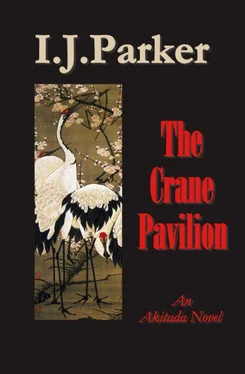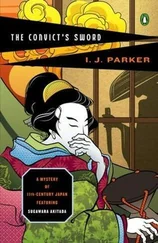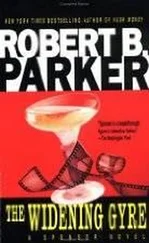I. Parker - The Crane Pavillion
Здесь есть возможность читать онлайн «I. Parker - The Crane Pavillion» весь текст электронной книги совершенно бесплатно (целиком полную версию без сокращений). В некоторых случаях можно слушать аудио, скачать через торрент в формате fb2 и присутствует краткое содержание. Жанр: Исторический детектив, на английском языке. Описание произведения, (предисловие) а так же отзывы посетителей доступны на портале библиотеки ЛибКат.
- Название:The Crane Pavillion
- Автор:
- Жанр:
- Год:неизвестен
- ISBN:нет данных
- Рейтинг книги:5 / 5. Голосов: 1
-
Избранное:Добавить в избранное
- Отзывы:
-
Ваша оценка:
- 100
- 1
- 2
- 3
- 4
- 5
The Crane Pavillion: краткое содержание, описание и аннотация
Предлагаем к чтению аннотацию, описание, краткое содержание или предисловие (зависит от того, что написал сам автор книги «The Crane Pavillion»). Если вы не нашли необходимую информацию о книге — напишите в комментариях, мы постараемся отыскать её.
The Crane Pavillion — читать онлайн бесплатно полную книгу (весь текст) целиком
Ниже представлен текст книги, разбитый по страницам. Система сохранения места последней прочитанной страницы, позволяет с удобством читать онлайн бесплатно книгу «The Crane Pavillion», без необходимости каждый раз заново искать на чём Вы остановились. Поставьте закладку, и сможете в любой момент перейти на страницу, на которой закончили чтение.
Интервал:
Закладка:
Akitada watched her and thought that a daughter needed a family with money or influence who could secure her a good husband who would respect her and take care of her. And his son would need the same to make his way in the world, to get a good education and a government position so that he could support his own family some day.
Akitada’s own father, for all his harshness, had found a way to get Akitada into the imperial university and later into the ministry of justice. Such things came with fatherhood.
He reached again for his daughter, but Yasuko struggled in his arms. He released her quickly. “Sorry, I didn’t mean to hurt you,” he said.
She reached for his hand. “You didn’t, but my gown will get wrinkled. Thank you for coming, Father. We have missed you.”
He was ashamed. “I’ll come every day if you like,” he said, adding with a teasing smile, “so be sure to be ready to receive me next time.”
She laughed.
“How are the lessons going?”
Yasuko and her brother exchanged glances. Yoshi said, “ Sensei is not much fun. I get sleepy.”
His father said, “You must try harder. Lessons aren’t supposed to be fun.”
“We’ll try harder, Father, Yasuko said. “I’ll sit next to Yoshi and pinch him when he dozes off.”
The maid reappeared, having managed to get dressed and tie up her hair. She blushed and bowed. “Shall I bring the children’s gruel, sir?”
“Yes, and bring an extra bowl for me.”
As Akitada took his morning meal with the children, listening to their chatter, he made up his mind to do so as often as it might be managed. Of course, if he should be able to return to government service again, he would already have left the house by dawn.
And this reminded him of his responsibilities. He took his leave from the children and went back to his room, trying to think of men of influence who might be able to help him. In the end, he came up with no one but Kosehira and wrote his friend a letter. Kosehira had lost most of his influence at court since he had supported Prince Atsuhira recently and been suspected of treasonable activities.
When the letter was done, he could not face sitting in his room any longer to wait for news from court. Getting up, he got dressed, then went to speak to Genba, who had returned with feed for the horses.
“Genba,” he said, “I’m going back to Abbot Genshin’s mansion. If anyone comes from the Daidairi, send the boy to fetch me.”
He wasn’t at all sure what he hoped to do there. Perhaps, if Genshin had an interest in finding out what had caused the lady’s death, the abbot might thank him by using his influence at court, but the very thought of asking such a favor sickened him.
No, he was going back on a whim, with a notion that there was a secret to be uncovered, and because it was an excuse to leave his house and forget his troubles and his grief for a little while.
This time he did not bother to knock at the small gate set into the large, imposing one but merely pushed it open and walked in. Like last time, the forecourt lay empty, weeds growing here and there, and the autumn chill had touched the trees beyond the main house with golden and auburn colors.
Akitada had no plan and no more questions to ask the inhabitants, but he wanted to look again at the dead woman’s pavilion. He felt strongly that the secret lay there, and while her room had revealed little, he wanted to see it again in hopes that he might learn something.
On this occasion, he wandered around the pavilion to look at the small lake behind it. The lake was fed by one of the many small streams that passed through the city and made possible the network of canals and the elaborate gardens of noble houses and palaces. This lake was home to a number of ducks, and as he came closer, he caused a pair of cranes to fly up with a clatter of wings. They were large, handsome creatures with their black and white plumage and brilliant red patches on their heads. Their wingspan was impressive, and they might have risen high into the sky to make for some larger watery habitat, like Lake Biwa, or even the Inland Sea. But they flew only to the opposite side of the lake and returned to stalking the fish. The lake seemed well-stocked with them. Perhaps the cranes had made a permanent home here.
He turned and studied the pavilion. Its curved tile roof swept out much like the wings of a large bird, overhanging verandas that must have offered the dead woman lovely views of the small lake. Here was, without a doubt, the best accommodation Abbot Genshin’s large and elegant residence had to offer. It was typically the sort of pavilion a man might reserve for a favored companion. Who had Lady Ogata been? What had she been to her host? And why had she died?
He had no proof that her death was anything but suicide, but then there was no proof it had been suicide except the placement of the trunk underneath a beam. What kept him coming back was the strong feeling that all was not as it had appeared. He knew that he should speak to Genshin about this but could not bring himself to do so.
He walked up to the pavilion and onto the veranda. From there he looked out over the garden. All was peaceful and serene.
And yet.
Pushing open a shutter, he walked again into that dim room. The few items of furniture were as they had been last time. She had been very poor but had clung to some of the clothes of a far more elegant past. A shocking event must have caused the change in her life. And yet it had not been enough for her to take her life when it had happened. So, why now?
He saw nothing to answer his questions, and eventually turned to go back out into the garden. He saw the path that led to the caretaker’s cottage. While the man had acted somewhat strangely, he had been forthright in his description of what he had found that morning. There were, of course, also the two children who had raised the alarm. He ought to try to find them.
Peering at the dense cover of trees that separated the pavilion from the outer wall, he thought of the city that lay beyond, and of the children who had come from there. He assumed they lived among the tenements or humble homes, for they were said to belong to a poor woman who had to work during the day, leaving them on their own.
Another female who was alone. All she had were her children.
But that was more than the dead woman had had.
He thought of his own loneliness. Yes, he was blessed by fortune in that it had left him his son and daughter. He had enjoyed his morning with them. They seemed to him handsome, affectionate, and loveable. It was a pity he had never taken enough time to get to know his own children. Now, like the poor mother, he must work to provide for them, and they would again grow distant.
As he gazed at the large garden of the rich man who had forsaken the world and its pleasures to become a monk, he wondered if Tasuku had really made a clean break from his former life.
Akitada decided there were no answers for him here. He must begin to call on men in the emperor’s service, begging them to support him. It was all very distasteful and humiliating, but it must be done.
He bowed his head and walked away from the mystery of Lady Ogata.
But in his abstraction, he took the wrong path. It curved away suddenly and plunged into some dense undergrowth before suddenly emerging in a small clearing with a rustic building made from logs and covered with a roof of cypress bark.
He stopped. This sort of thing was not unusual on large estates. Such places were used for religious observances, meditation, and perhaps childbirth when the owner feared the event would contaminate the main house. Shinto abhorred the uncleanness of death and birth equally.
He stood there, lost in thoughts about the human lifespan when he realized that the building’s single door was open. Walking closer, he called out, and a moment later a small gray figure appeared in the doorway.
Читать дальшеИнтервал:
Закладка:
Похожие книги на «The Crane Pavillion»
Представляем Вашему вниманию похожие книги на «The Crane Pavillion» списком для выбора. Мы отобрали схожую по названию и смыслу литературу в надежде предоставить читателям больше вариантов отыскать новые, интересные, ещё непрочитанные произведения.
Обсуждение, отзывы о книге «The Crane Pavillion» и просто собственные мнения читателей. Оставьте ваши комментарии, напишите, что Вы думаете о произведении, его смысле или главных героях. Укажите что конкретно понравилось, а что нет, и почему Вы так считаете.












